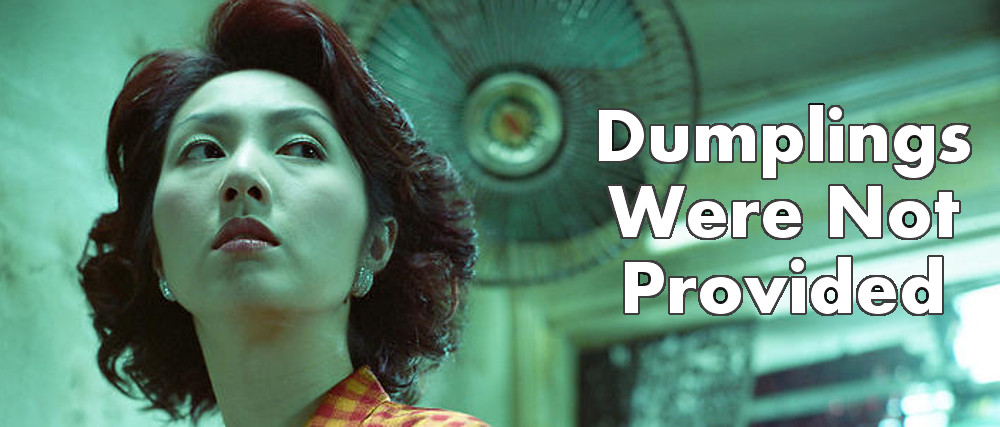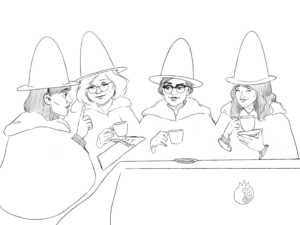In any stereotypical horror movie, you follow a female protagonist as she is stalked by some kind of monster, human or otherwise. But how often is that monster actually the patriarchy? The characters of the Hong Kong-produced horror film Dumplings are all tied together by one vile entity: the cultural fetishization of women’s youth. While the wealthy are pressured to take increasingly grotesque steps to maintain their youth, they often do these things at the expense of poor women. But as this movie shows, nobody — wealthy or poor, male or female — can win against a monster that turns women’s bodies into products.
The film was recently screened through Alt Girl Cinema, the Women’s Community Center of Central Texas’ pop-up theater series. The gracious hosts provided delicious cupcakes before, during, and after the showing. Dumplings were not provided, which was kind of disappointing as, after the movie, I had a desire for them. The movie, however, did not disappoint. Let’s get this out of the way: no matter how much you know about this movie going in, you will not be spoiled by that knowledge because it’s very much a movie about the journey and not the destination.

Dumplings follows Mrs. Li, a well-to-do 40-something Hong Kong resident and former TV star. Li struggles with aging and the “wandering eye” of her husband, a high-ranking corporate executive. She goes to see Aunt Mei, a woman who promises that her dumplings can rejuvenate her patrons in a way that she claims no cosmetic company can. The main ingredient, however, is fetuses taken willingly from women who have had legal abortions following the Chinese state’s One Child Policy. (These fetuses are mostly female because as Aunt Mei reminds us, this policy caused Chinese families to sex-select for males, but we’ll get back to this later.) The movie seems to expect that viewers already know this and I have no doubt that Dumplings will always be introduced to new viewers as “that movie where they eat fetus dumplings.” It’s horrifying and it’s gross, but the most amazing part of this plot device is that it’s the tip of the iceberg of the film’s monstrosity.
Aunt Mei sits at the center of the movie, though she is not the main character. Where the Western witch-obsessed-with-extending-her-youth-by-magically-devouring-the-young archetype and Eastern food therapy collide, we have Aunt Mei. As a highly sensual, seemingly-30-something woman who served in China as an OB/GYN before setting up shop in Hong Kong, she constantly cackles at Mrs. Li’s discomfort about eating her dumplings. Harkening back to older horror story villains like the Devil in Needful Things, Mei appears to be the film’s primary antagonist as she warns Li during her first visit to her shop that while the dumplings certainly work, they… come at a cost. She even advises Mrs. Li that she’d be better off dealing with her husband’s fading interest by finding some form of financial self-sufficiency rather than chasing the ol’ fetus dragon. Later, as Li falls into a fixation with finding increasingly rare fetuses, Aunt Mei mocks her by reminding her of how beautiful she looked when she was a TV star. (What makes a fetus “rare” you may ask? According to Mei, the youthful effects of eating a fetus increase if it is midterm and conceived under perverse circumstances. Yeesh.)

Aunt Mei appears monstrous in her own right as she consumes her own grisly product and seems to take glee in watching Mrs. Li struggle, but she is as much a victim of the film’s all-consuming monster as her patrons. You see, that stalking monster is no ghost-fetus that has come to haunt Mrs. Li, or a witch with a promise of indefinite youth. Mrs. Li doesn’t eat a mutant fetus, grow 10 stories tall and crush her husband while raiding hospitals across China for more fetuses. The invisible monster is the cultural fetishization of youth that Li, Mei, and even Li’s cheating husband fall victim to and eventually perpetuate as it drives them to terrible acts of emotional and literal violence against each other and the working class families they take advantage of. As Mrs. Li quietly simmers in anger as her friends obsess over her looks and her husband spends his time fucking young women, Mr. Li worries about his own waning presence at work and his affairs come off as more pathetic than vicious in nature because his mistress appears to be using him for money. Even Aunt Mei, seemingly always in control of her own destiny and wise beyond her apparent age, dejectedly declares that age is only a number when the hottest scene in the movie (an almost overwhelmingly passionate affair between Aunt Mei and Mr. Li) comes to a screeching halt after Mr. Li realizes how old she is.
Quite frankly, they’re the lucky ones. The film is careful to show that this dreaded monster causes the worst fallout the poorest members of the community. Those rare fetuses that Mrs. Li obsesses over? The first comes from a fifteen-year-old rape victim who can’t afford a legal abortion and dies because Aunt Mei won’t medicate her for fear of ruining the product before she harvests it. The second comes from Mr. Li’s young masseuse/mistress who is used by both Mr. Li as he pursues her to sate his own sense of impotence, and by Mrs. Li as she believes her husband’s bastard child might make for the perfect youth serum. Hell, the entire film’s conceit is that wealthy Hong Kong residents, in their obsession with maintaining their youth, are quite literally devouring the poor in the form of female fetuses harvested from women in mainland China. By the end of the story, even Aunt Mei threatens to be consumed by the affairs of the wealthy. Seeing that she is a relatively poor Hong Kong resident connected to at least two deaths and two increasingly unhinged bluebloods, she knows that she wouldn’t be able to shield herself from the fallout and escapes outside Hong Kong to nearby Shenzhen.
Beyond eating fetuses and class conflict, what ends up standing out is this dire cycle in which women’s bodies are commodified. Whether it’s as unwanted fetuses tossed aside by a bleak state policy, teenagers as unwilling vessels for their unborn children, or former TV stars used and discarded by the entertainment industry and their husbands, these ladies just can’t win. But hey, life’s not all bad. Ultimately, I was able to warm up some pork-and-cabbage dumplings of my own at home, so if you were worried after reading earlier about my dumplings situation, you can now rest-assured that my hankering was sated.

Alt Girl Cinema’s next screening is Ana Mendieta: Fuego de Tierra. If you’re in the area, be sure to check it out!




